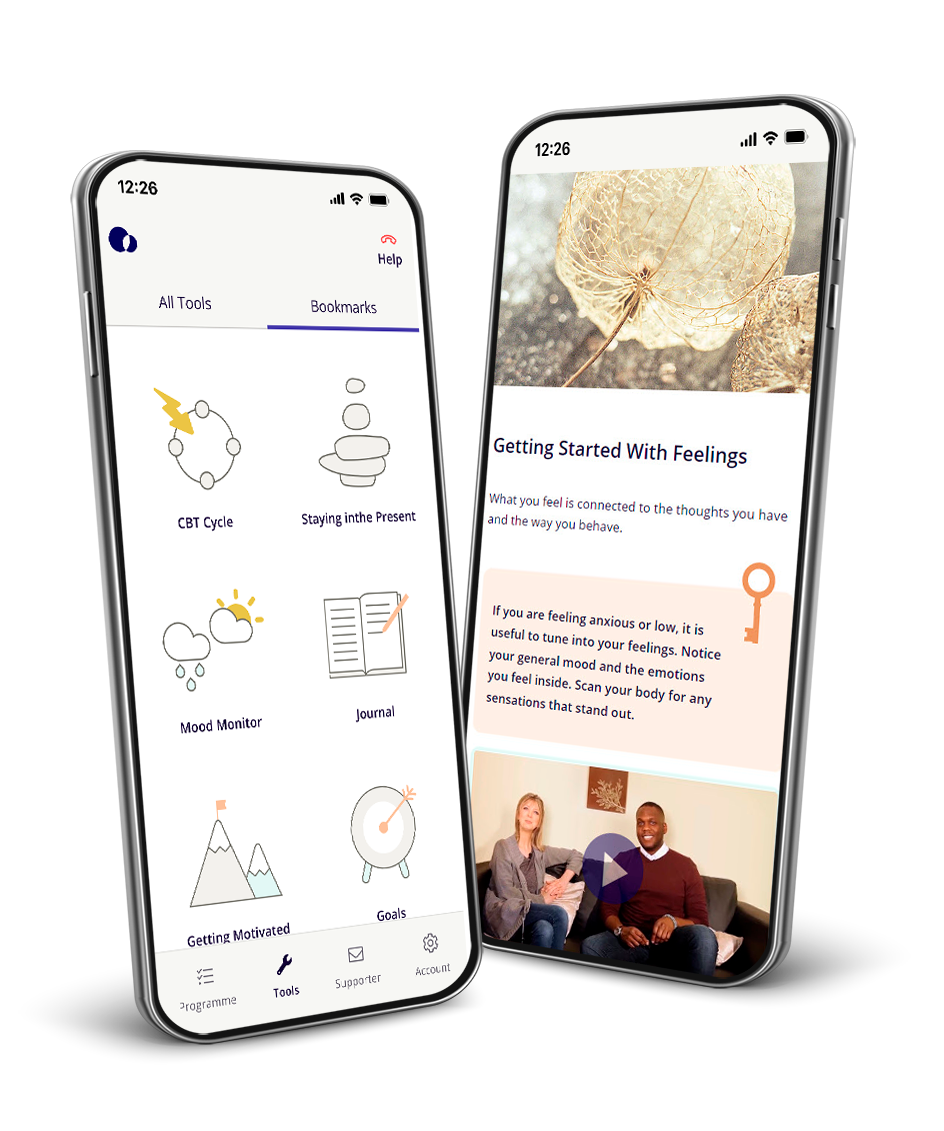
Case Study
How Shropshire, Telford and Wrekin NHS Talking Therapies is supporting patients at Step 3 with digital mental health tools.
Tools for Therapy by SilverCloud® Amwell®, empowers therapists and patients with a suite of digital tools to improve outcomes and engagement during, in between and post therapy session
Organisation
Shropshire, Telford and Wrekin NHS Talking Therapies at Midlands Partnership University NHS Foundation Trust


Background
The SilverCloud® platform has been a partner of Shropshire, Telford and Wrekin NHS Talking Therapies, part of the Midlands Partnership University NHS Foundation Trust (MPUFT), since 2015 and has supported over 15,000 people through evidence-based digital mental health programmes.
SilverCloud® programmes have been a popular option with Shropshire, Telford and Wrekin NHS Talking Therapies patients and practitioners working at Step 2 with 90% of users experiencing tangible, positive benefits.
Given the success of the programmes at Step 2, the service was interested in implementing digital to support therapists and patients at Step 3. However, the standard model of asynchronous support did not offer the flexibility that was needed to introduce digital programmes into high intensity Step 3 treatments.
In 2023, Amwell launched the SilverCloud platform’s Tools for Therapy , a set of additional features that can be added to the SilverCloud platform to allow practitioners to work collaboratively with patients, either in person or online.
As a valued partner, the SilverCloud platform invited Shropshire, Telford and Wrekin NHS Talking Therapies to pilot Tools for Therapy with their Step 3, high intensity CBT practitioners. With enhanced functionality and upgraded programmes, SilverCloud Tools for Therapy allows services to open up new treatment options, offering additional choice and extended support for people with more complex conditions.
The Challenge
“ At Step 3, digital can’t be a standalone treatment,” explains Amy, a CBT therapist at Shropshire, Telford and Wrekin NHS Talking Therapies. “It needs to be an adjunct to the work we do in one-to-one sessions, enhancing therapy and helping the client embed their learning.”

The Solution
Amwell developed the SilverCloud platform’s Tools for Therapy in partnership with NHS clinicians to address exactly these issues.
With Tools for Therapy, services have access to a range of additional features on the SilverCloud platform that opens up digital to a wider group of clients, including those who need extra support at Step 2, and clients at Step 3 with more complex conditions such as Social Anxiety, Generalised Anxiety Disorder (GAD), Obsessive Compulsive Disorder (OCD) or Trauma.
Programmes for these conditions feature enhanced content and tools to meet the protocol-driven delivery needs of NICE recommended interventions for complex conditions.
Therapists can use the SilverCloud platform during live sessions, either in a room or online, with the therapist and client working together to complete content, edit tools or add information as they go along. Progress is saved automatically and can be accessed by the patient as soon as the session is complete.
With Tools for Therapy, services continue to use their existing video software. Simply by using the screenshare facility, therapists can open the SilverCloud platform to collaborate on the programme with their client.
Session summaries, including tools used and outcome measures collected, are saved automatically and flow into the service’s case management system saving valuable admin time that therapists can use to focus on the therapeutic aspects of their role.
Amy has used the SilverCloud platform with Tools for Therapy in online and face-to-face therapy sessions for clients across a range of ages since the start of the pilot programme.
“ “It’s very flexible so it’s not prescriptive and there’s no set way of using it,” she explains.
“I tend to direct clients to tools or modules that I think will be useful for them or we might use it in the session itself. And because clients can return to the work that we’ve done it helps them to consolidate it or practice in between sessions.”

Testimonials
Tools for Therapy has been a very helpful tool for our High Intensity Therapists to use with their clients. Having evidence-based resources all stored in one place that we can access with the client during a session, and they can access between sessions, has been really useful.
Hannah, Highly Specialised CBT Lead at Shropshire, Telford and Wrekin NHS Talking Therapies
The Impact
Since implementing Tools for Therapy, Shropshire, Telford and Wrekin NHS Talking Therapies has found SilverCloud programmes to be a valuable addition to the way they deliver support to clients at Step 3.
“ Simply by offering digital as an option we’re involving patients in the therapy process and giving them autonomy in how they access tools and resources,"
explains Amy.
It has also been helpful for emphasising the value of between-session exercises.
“ It’s really good at engaging clients better in between sessions"
says Amy. “If someone has taken the time to work on something at home, we can easily access it in the session. Either they show me on their phone, or I pull it up on my laptop and we can talk it through.”
Amy gives the example of a client she worked with using the SilverCloud Social Anxiety programme, which includes protocol-driven tools and activities such as Behavioural Experiments and Attention Training that can be unlocked for clients at an appropriate point in their therapy.
“ This client found the Behavioural Experiments tool extremely helpful. They didn’t like paper copies as they tended to misplace them, so having all the information in the SilverCloud app on their phone really worked for them. It was a very collaborative process; they would get their phone out and we would plan the experiments there and then. They would then do the experiments between sessions and record them. All their experiments were there in the app so when they looked back at how they had challenged themselves it gave them a real sense of achievement."
Patients retain access to the SilverCloud platform even when their therapy has come to an end so it’s a useful resource for clients to look back on.
“ It helps to empower clients so they feel confident in maintaining the skills they have developed,"
explains Amy. “It’s really useful to know that they have something engaging and evidence-based to help them to consolidate their therapy gains and maintain wellbeing post therapy.”
Feedback on the implementation of Tools for Therapy has been very positive.
Benefits to patients
Convenience
Patients lose printouts or miss emails. They liked the option of having everything stored on their phone.
User friendly
Patients thought the platform was accessible and easy to use.
Useful
Built-in session summaries provide a helpful reference for patients to refer back to.
Relevant to real-world settings
When problems occurred outside of the therapy room patients could use the programme to support them in the moment.
Reassuring
Patients can retain access to the SilverCloud platform once their therapy comes to an end, supporting their continued wellbeing and relapse prevention plan.
Supported
There is a supporter in the mix – a human link guiding the patient through their programme to ensure they get the best results.
Benefits to practitioners
Flexibility
Practitioners liked the flexibility of Tools for Therapy, allowing them to integrate it into their practice in a variety of ways.
Personalised
Practitioners can control access to the content, bookmark tools or unlock modules as appropriate to tailor a programme for their patient.
Efficient
Everything is contained in the platform so there’s no need to create work sheets to hand out or scan work completed during the session.
Visibility
Clinicians can see what work the client has completed between sessions and send reminders via the secure messaging facility.
Helpful
Tools for Therapy offers a broad range of evidence-based tools and modules to support practitioners in their work.
Risk
Digital supports clinicians to manage and flag risk.








